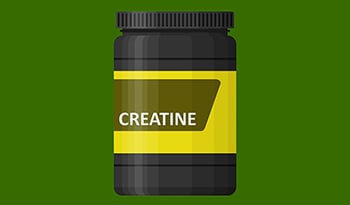Can CLA Help with Muscle Growth?
DISCLAIMER:This blog does not intend to provide diagnosis...

By Lisa Payne, CPT
When it comes to losing weight and gaining muscle, many people go to the ends of the earth in search of solutions to make that process more efficiently attainable. In addition to maintaining a balanced diet, building a consistent exercise regime and keeping up with regular doctor visits, many believe that adding the supplement CLA can help.
What Is CLA?
CLA, or conjugated linoleic acid, is a naturally occurring fatty acid found in grass-fed beef, bison, buffalo, lamb and other ruminants. You can also find it in foods like whole milk, yogurt, salmon, coconut oil, safflower oil and other food products. The CLA supplement has been commonly promoted as a weight loss and muscle building aid. It’s also believed to benefit those with cardiovascular disease, diabetes and even cancers like breast and lung.
To give you a basic background, linoleic acid is one of two doubly unsaturated fatty acids. It’s the main fatty acid found in plant oils like soybean, corn and grapeseed oil. Linoleic acid also is an omega-6 fatty acid. The other essential fatty acid, linolenic acid is an omega-3 fatty acid. Both of them are polyunsaturated fatty acids that possess two or more double bonds. Fatty acids are needed in our body for essential cell function. Conjugated linoleic acid is a joining together of different forms of linoleic acid. As CLA, it supports reduced inflammation and tissue repair. Since the body doesn’t make linoleic acid naturally, it must be consumed with a balanced diet.
So, how can CLA improve weight loss and muscle gain efforts exactly? Here’s the assertion:
- Helps break down fat cells
- Increases fatty acid oxidation from stored fat
- Increases energy expenditure during asleep
- Prevents the metabolism from slowing while on a calorie-restricted diet
- Increases muscle size and strength
- Increases lean muscle mass
- Enhances physical performance
What the Studies Say
Numerous studies have been done on the effects of CLA on weight loss and muscle growth since the 1980s. Many suggest that adding a CLA supplement to your normal healthy diet can primarily reduce body fat mass (BFM). According to the Journal of Nutrition, a double-blind study including 60 obese or overweight individuals were divided into 5 groups receiving a placebo of 9g olive oil, or 1.7, 3.4, 5.1 or 6.8g of conjugated linoleic acid each day for 12 weeks. 47 individuals completed the study and used dual-energy x-ray absorptiometry to measure their body composition. Repeated measures found that there was a higher rate of BFM reduction in those who were given CLA. However, the results also stated no significant differences were found when it came to lean body mass, body mass index (BMI) or blood variables.
Other studies do suggest that CLA may enhance physical performance and increase lean body mass. It may create physiological changes in the skeletal muscle that could change the muscle fiber type. These studies also maintain that CLA affects the intercellular signaling pathways in muscle metabolism.
While studies have proven moderate success in weight loss and muscle growth with CLA, they are still ongoing. As with any supplementation, always get your physician’s approval before starting any new program.
References:
- Blankson H, et al. "Conjugated Linoleic Acid Reduces Body Fat Mass In Overweight And Obese Humans. - Pubmed - NCBI". Ncbi.Nlm.Nih.Gov, 2018, https://www.ncbi.nlm.nih.gov/pubmed/11110851. Accessed 9 Aug 2018.
- Kim, Y, et al. “Impact of Conjugated Linoleic Acid (CLA) on Skeletal Muscle Metabolism.” Advances in Pediatrics., U.S. National Library of Medicine, Feb. 2016, www.ncbi.nlm.nih.gov/pubmed/26729488.

 By Lisa Payne, CPT
By Lisa Payne, CPT


